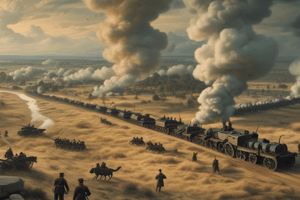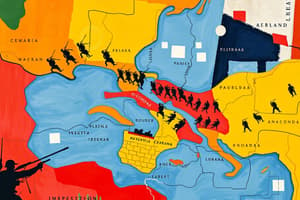Podcast
Questions and Answers
What was the Anaconda Plan?
What was the Anaconda Plan?
- The Union's plan to blockade the South (correct)
- A Confederate strategy to win the war
- A naval tactic used by Britain
- A campaign for emancipation
Who was Robert E. Lee?
Who was Robert E. Lee?
Confederate general who opposed secession but did not believe in holding the Union together by force.
What is the significance of Thomas 'Stonewall' Jackson?
What is the significance of Thomas 'Stonewall' Jackson?
Confederate general known for his fearless leadership and nicknamed for his valor.
What was the First Battle of Bull Run?
What was the First Battle of Bull Run?
Who was George McClellan?
Who was George McClellan?
What was the outcome of the Seven Days Campaign?
What was the outcome of the Seven Days Campaign?
What is a quaker gun?
What is a quaker gun?
What was the Battle of Antietam known for?
What was the Battle of Antietam known for?
Who was Ambrose E. Burnside?
Who was Ambrose E. Burnside?
The Battle of Fredericksburg resulted in a Union victory.
The Battle of Fredericksburg resulted in a Union victory.
What were the Copperheads?
What were the Copperheads?
Who was John C. Fremont?
Who was John C. Fremont?
What is the Emancipation Proclamation?
What is the Emancipation Proclamation?
The Ex Parte Merryman case upheld Lincoln's suspension of habeas corpus.
The Ex Parte Merryman case upheld Lincoln's suspension of habeas corpus.
What happened at the Battle of Chancellorsville?
What happened at the Battle of Chancellorsville?
What was significant about the Battle of Gettysburg?
What was significant about the Battle of Gettysburg?
Who was Ulysses S. Grant?
Who was Ulysses S. Grant?
What was the March to the Sea?
What was the March to the Sea?
Flashcards are hidden until you start studying
Study Notes
Anaconda Plan
- Union strategy developed by General Winfield Scott to blockade Southern ports and restrict trade to weaken the Confederacy.
Robert E. Lee
- Notable Confederate general who, despite opposing secession, believed the Union should not be held together by force.
Thomas "Stonewall" Jackson
- Renowned Confederate general recognized for his bold marching tactics and resilience at the Battle of Bull Run, where he earned his nickname. Mortally wounded by friendly fire at Chancellorsville.
First Battle of Bull Run
- Marked as the Civil War's first major engagement, resulting in untrained Union troops fleeing back to Washington, boosting Southern morale and emphasizing the war's prolonged nature.
George McClellan
- Major Union general credited with organizing the Army of the Potomac. His failure to accurately gauge Confederate strength led to setbacks during the Peninsula Campaign, resulting in his dismissal.
Seven Days Campaign
- Key turning point in the Virginia theater where Lee took initiative and reshaped the Confederate army, moving towards a new opponent as McClellan remained stationary.
Quaker Gun
- Created as a deceptive tactic, this was a wooden replica of a cannon used to mislead opponents.
Battle of Antietam
- Bloodiest single battle in the Civil War occurring in Maryland, resulting in 25,000 casualties and halting Lee's advance into the North.
Ambrose E. Burnside
- Union general who commanded troops in a disastrous frontal assault at the Battle of Fredericksburg, leading to significant Union losses.
Battle of Fredericksburg
- A notable Confederate victory where the Union suffered 12,000 casualties under Burnside’s command against Lee's experienced forces.
Copper Heads
- Northerners, mainly Democrats, opposing the Civil War and advocating for peace with the Confederacy, disparagingly labeled "Copperheads" due to the perceived danger they represented.
Joseph Hooker
- Succeeded Burnside as Union General; commanded troops against Lee during a later campaign.
Merrimac vs. Monitor
- First combat between ironclad warships, resulting in an indecisive outcome, marking a shift in naval warfare.
C.S.S. Hunley
- The first submarine in history to successfully sink an enemy warship, the Housatonic, during the Civil War.
John C. Fremont
- Military officer and explorer affiliated with the Republican Party as a presidential candidate opposing slavery; declared all slaves in Mississippi free.
Benjamin Butler
- Union general who commanded New Orleans post-capture, notorious for controversial and aggressive policies.
Slave Contraband
- Term referring to captured slaves, conscripted to aid the Union war effort, indicative of shifting Union policies on slavery.
Emancipation Proclamation
- Issued by Lincoln in September 1862, it declared freedom for slaves in Confederate states, except those in Union-controlled areas.
Ex Parte Merryman Case
- Landmark case addressing Lincoln's suspension of habeas corpus, deemed unconstitutional by Judge Taney.
John Merryman
- Arrested for secessionist activities; involved in the key legal case regarding the suspension of habeas corpus.
Battle of Chancellorsville
- A major Confederate victory led by Lee and Jackson, noted for Jackson's fatal wounding from friendly fire.
Battle at Gettysburg
- A pivotal three-day conflict resulting in extensive Union casualties, marking a significant defeat for Lee's forces and a turning point in the war.
Jeb Stuart
- Led Confederate cavalry; criticized for his late arrival and lack of preparation during the Battle of Gettysburg.
Harry Heth
- His division inadvertently initiated the Battle of Gettysburg.
James Longstreet
- Principal subordinate to Lee, involved in key victories and controversies, particularly at Gettysburg with the infamous Pickett’s Charge.
Winfield Hancock
- Democratic candidate for the 1880 presidential election, recognized as a Civil War hero, notably losing the electoral vote despite a close popular vote.
John Buford
- Union cavalry general known for his pivotal role in the initial engagement at Gettysburg.
Joshua L. Chamberlain
- Distinguished Union commander famed for his strategic stand at Little Round Top during Gettysburg, utilizing a bold bayonet charge to secure his position.
Richard Ewell
- Confederate general responsible for action against Union flanks at Gettysburg, slowed by indecisiveness on the first day.
Jubal Early
- Commanded part of Ewell’s division, known for his resolute nature during engagements.
Pickett's Charge
- A disastrous Confederate assault on the third day of the Battle of Gettysburg, leading to heavy losses for Lee’s forces.
Ulysses S. Grant
- Became a prominent Union general, later serving as the 18th President; his military acumen was critical in securing Union victories.
Vicksburg
- Marked as Grant's most successful campaign, resulting in Union control of the Mississippi River after a protracted siege.
Battle of the Wilderness
- No clear victor emerged in this dense forest battle as Grant and Lee fought on May 5-6, 1864, further depleting Confederate forces.
Spotsylvania
- Site of intense fighting during the Civil War, characterized by fierce combat that felled large trees and saw Lee retreat while Grant pursued.
Cold Harbor
- Grant's ill-fated frontal assault on a strong Confederate position on June 3, 1864, resulted in devastating Union losses.
W.T. Sherman
- Union general known for his total war strategy, leading the destructive march from Atlanta to the sea, altering the dynamics of warfare.
March of the Sea
- Sherman’s strategy to travel from Tennessee to Savannah, Georgia, utilizing scorched-earth tactics to demoralize the South.
Studying That Suits You
Use AI to generate personalized quizzes and flashcards to suit your learning preferences.




